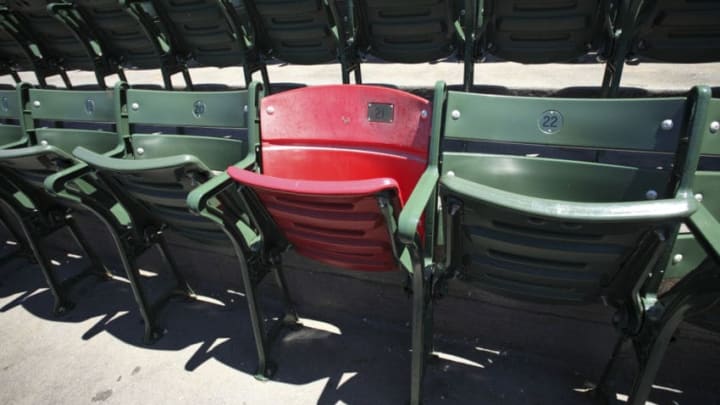The best season in the career of Red Sox legend Ted Williams.
We’ve reached the end of our five-part series counting down the best seasons in the career of Boston Red Sox outfielder Ted Williams. The Splendid Splinter had many outstanding seasons throughout his Hall of Fame career but his 1946 campaign stands out among the rest.
Williams was the runner-up for the MVP award in consecutive seasons, hitting over .400 in 1941 and capturing his first Triple Crown the following season, before leaving the game to serve in the military during World War II. Arguably the best player in baseball at the time missed three years of his prime to fight for his country.
When he returned in 1946, Williams didn’t miss a beat. He signed a new contract to rejoin the Red Sox and wasted no time in reminding everyone what he could do with a bat in his hands.
Williams hit .342 with 38 home runs and 123 RBI that season. He didn’t lead the league in any of those categories but the home run total set a new career-high at the time and would end up equaling the second-highest single-season mark of his career.
There were plenty of other categories that Williams did lead in though, including a .497 OBP, .667 SLG, 156 walks and 142 runs scored. His 1.164 OPS was the third-highest of his career.
In June of that season, Williams mashed a 502-foot home run into the right field bleachers. The spot where the ball landed is now marked with a red seat and is still considered the longest home run ever hit at Fenway Park.
Baseball-Reference credited Williams with a career-high 10.6 WAR that season. FanGraphs also rates 1946 as his best season with 11.6 WAR, the best in franchise history and tied for 12th in major league history. Considering six of the top-10 single-season fWAR ratings belong to Babe Ruth, there are very few hitters who can say they had a better year than Williams did in ’46.
The performance earned Williams his first MVP award. Teammates Bobby Doerr and Johnny Pesky finished third and fourth on the ballot respectively as the Red Sox won the pennant.
More from Red Sox History
- Two notable Red Sox anniversaries highlight current organizational failures
- Contemporary Era Committee doesn’t elect any former Red Sox to Hall of Fame
- Johnny Damon calls Red Sox out, reveals hilarious way he skirted Yankees’ grooming policy
- Remembering the best Red Sox Thanksgiving ever
- Red Sox World Series legends headline 2023 Hall of Fame ballot
Boston’s 104 wins that season are the fourth-most in franchise history and gave the Red Sox a comfortable 12-game margin over the Detroit Tigers in the standings. The MLB schedule was only 156 games in those days so Boston’s .675 winning percentage tops the .667 mark from the 2018 team that won a franchise record 108 games.
1946 was the first and only trip to the postseason for Williams but it would be one full of regrets. Williams was hit on the elbow by a pitch during an exhibition game days before the World Series began and battled soreness throughout the series that hindered his swing. He went 5-for-25 (.200) without an extra-base hit and only one RBI in the seven-game series against the St. Louis Cardinals.
That includes an 0-for-4 performance in a Game 7 that the Red Sox lost by one run. Boston rallied to tie the game in the eighth inning but Williams popped out to end the frame, stranding the go-ahead run in scoring position. St. Louis scored the winning run in the bottom of the inning to win the World Series and extending the Red Sox title drought to nearly three decades.
Boston came close to the pennant a couple more times with Williams, losing a one-game playoff to Cleveland in 1948 and coughing up the lead the following year by dropping their final two regular season games to the Yankees. Williams never did get another shot at postseason glory though and his one chance was spoiled by injury.
While the series with St. Louis didn’t pan out for Williams, reaching the postseason for the only time in his career has as much to do with 1946 being his best year as the MVP trophy or career-high WAR.
